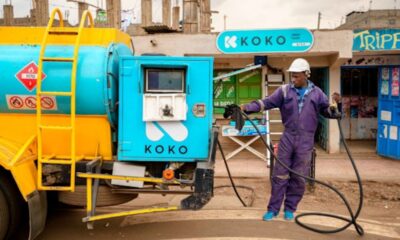Investigations
Kenyan House of Scammers: Beware

An Investigative Report on Real Estate Fraud Targeting Diaspora Investors
In the shadow of Kenya’s booming real estate sector lurks a sinister network of predatory companies that have turned property investment into a sophisticated con game. The victims? Hardworking Kenyans living abroad who dream of owning a piece of home, only to discover they’ve been ensnared in elaborate fraudulent schemes that would make even the most notorious historical scammers blush.
The Modern-Day Poyais Scam
The parallels to the infamous 1820s Poyais land scam are striking. Just as Gregor MacGregor invented a fictional country to defraud investors of £1.3 million, today’s Kenyan property fraudsters create elaborate illusions of luxury developments that exist only in glossy marketing materials and carefully crafted YouTube videos.
The modus operandi is disturbingly similar: promising investors prime real estate opportunities, collecting substantial deposits, and then vanishing into thin air—leaving behind only broken dreams and legal battles.
The Faces Behind the Facade
Through extensive investigation, three key players have emerged as the architects of Kenya’s diaspora property fraud epidemic:
Patrick Muchoki – Mahiga Homes Limited
Muchoki’s company collected approximately Sh110 million from investors for the Rock Gardens 2 project in Ruiru. What was promised as a seven-acre gated community housing three-bedroom maisonettes for Sh5.5 million each has devolved into an abandoned thicket. Victims like retired teacher Cynthia Mwanthi, who invested her entire retirement savings of Sh5.5 million, now face the reality that their dream homes exist only on paper.
Ejidio Kinyajui – Willstone Homes Limited
A former sales manager at the collapsed Banda Homes Limited (which went under with Sh5 billion in investor funds), Kinyajui has seemingly learned nothing from his previous company’s spectacular failure. His Manna Residence project in Ruiru has become a legal quagmire, with investors like Julius Njeru and Joseph Kiiru fighting in court to recover millions in deposits for houses that were never built.
Peter Nyaga – Certified Homes Limited
Nyaga, a former executive of Mahiga Homes, has carved out his own niche in diaspora fraud. His company targeted Kenyan women in the USA through the KWITU (Kenyan Women in the USA Gardens) project, collecting Sh15.5 million from three investors. The project has since collapsed amid disputes over land ownership, with victims discovering that leasehold land had been misrepresented as freehold property.
The Diaspora Targeting Strategy
These fraudulent companies have developed a sophisticated targeting mechanism that specifically exploits the vulnerabilities of diaspora investors:
- Social Media Exploitation: Companies sponsor YouTube channels like “Kenya Diaspora Media” to create an illusion of legitimacy and reach.
- Emotional Manipulation: Marketing materials specifically target the emotional desire of diaspora Kenyans to own property “back home,” particularly for retirement.
- False Credibility: Companies purchase awards and sponsor ceremonies to create an aura of respectability, then use these accolades in their marketing materials.
- Influencer Partnerships: Social media influencers are paid to promote these schemes without verifying the authenticity of the companies they endorse.
The Scale of the Problem
The financial impact of these scams is staggering. From the cases documented:
- Mahiga Homes: Sh110 million collected from just one project
- Willstone Homes: Multiple cases totaling millions in deposits
- Certified Homes: Sh15.5 million from three investors alone
- Banda Homes (Kinyajui’s previous company): Sh5 billion in investor losses
According to Kenya’s ICT Cabinet Secretary, Kenyans lose up to $120 million annually (equivalent to Sh13 billion) to online scammers, with real estate fraud representing a significant portion of these losses.
The Regulatory Vacuum
The Real Estate Stakeholders Association (RESA) has acknowledged the crisis. Chairman James Kinyua admitted to the Daily Nation: “I admit there is a big problem in the industry, and most people are not honest… we have so far deregistered some companies from our association.”
However, the regulatory framework remains inadequate. The association is made up of over 100 firms and seeks to restore accountability and regulation in the industry, but without legal authority to prosecute fraudsters, it can only rely on voluntary compliance.
Red Flags Every Investor Must Know
Based on documented cases, here are the warning signs of real estate fraud:
1. Ownership Obfuscation
- Companies that cannot provide clear title documentation
- Conflicting information about land ownership (freehold vs. leasehold)
- Projects built on land owned by third parties
2. Unrealistic Timelines
- Promises of completion within 30-90 days
- Immediate construction start upon deposit payment
- Aggressive payment schedules
3. Excessive Upfront Payments
- Requests for deposits exceeding 10% of purchase price
- Demands for full payment before construction begins
- Reluctance to use escrow accounts or advocate trusts
4. Marketing Red Flags
- Heavy reliance on social media marketing
- Targeting specific demographics (diaspora, women, retirees)
- Sponsored awards and fake credibility markers
The Human Cost
Behind every fraudulent scheme are real people whose lives have been devastated. Cynthia Mwanthi, who lost her entire retirement savings, represents thousands of Kenyans who trusted these companies with their life savings. The psychological trauma extends beyond financial loss—it’s the crushing of dreams and the destruction of trust in Kenya’s investment climate.
Legal Remedies and Hope
Some victims have found success through legal action. William Kiama’s arbitration case against Vaal Real Estate resulted in a Sh9 million award, demonstrating that justice is possible when victims are willing to fight. However, the legal process is lengthy and expensive, often beyond the reach of many victims.
The Way Forward
To combat this epidemic of fraud, Kenya needs:
- Stronger Regulatory Framework: Establishment of a powerful real estate regulatory body with prosecutorial powers
- Mandatory Escrow Accounts: All property transactions should be conducted through independent escrow accounts
- Social Media Regulation: Stricter controls on property marketing, similar to gambling advertising restrictions
- Diaspora Protection Programs: Specialized units to assist overseas Kenyans in property investment verification
- Public Awareness Campaigns: Education about red flags and due diligence procedures
Conclusion: Caveat Emptor
The Kenyan real estate sector’s reputation hangs in the balance. While legitimate developers continue to deliver quality projects, the actions of a few fraudulent companies threaten to destroy investor confidence entirely. For diaspora Kenyans, the dream of owning property back home shouldn’t become a nightmare of financial ruin.
The message is clear: in Kenya’s real estate market, buyer beware. The house of scammers is real, and their victims are paying the price with their life savings and shattered dreams.
Kenya Insights allows guest blogging, if you want to be published on Kenya’s most authoritative and accurate blog, have an expose, news TIPS, story angles, human interest stories, drop us an email on [email protected] or via Telegram
-

 Grapevine1 week ago
Grapevine1 week agoAlleged Male Lover Claims His Life Is in Danger, Leaks Screenshots and Private Videos Linking SportPesa CEO Ronald Karauri
-

 Lifestyle2 weeks ago
Lifestyle2 weeks agoThe General’s Fall: From Barracks To Bankruptcy As Illness Ravages Karangi’s Memory And Empire
-

 Grapevine5 days ago
Grapevine5 days agoRussian Man’s Secret Sex Recordings Ignite Fury as Questions Mount Over Consent and Easy Pick-Ups in Nairobi
-

 Investigations2 days ago
Investigations2 days agoMulti-Million Dollar Fraud: Three Kenyans Face US Extradition in Massive Cybercrime Conspiracy
-

 Investigations2 weeks ago
Investigations2 weeks agoEpstein’s Girlfriend Ghislaine Maxwell Frequently Visited Kenya As Files Reveal Local Secret Links With The Underage Sex Trafficking Ring
-

 News2 weeks ago
News2 weeks agoState Agency Exposes Five Top Names Linked To Poor Building Approvals In Nairobi, Recommends Dismissal After City Hall Probe
-

 Business1 week ago
Business1 week agoM-Gas Pursues Carbon Credit Billions as Koko Networks Wreckage Exposes Market’s Dark Underbelly
-

 Business2 weeks ago
Business2 weeks agoThe Crash of Koko Networks: A Detailed Look Into How and Why It Happened, And The Potential For A “Silver Lining” For Carbon Integrity
















